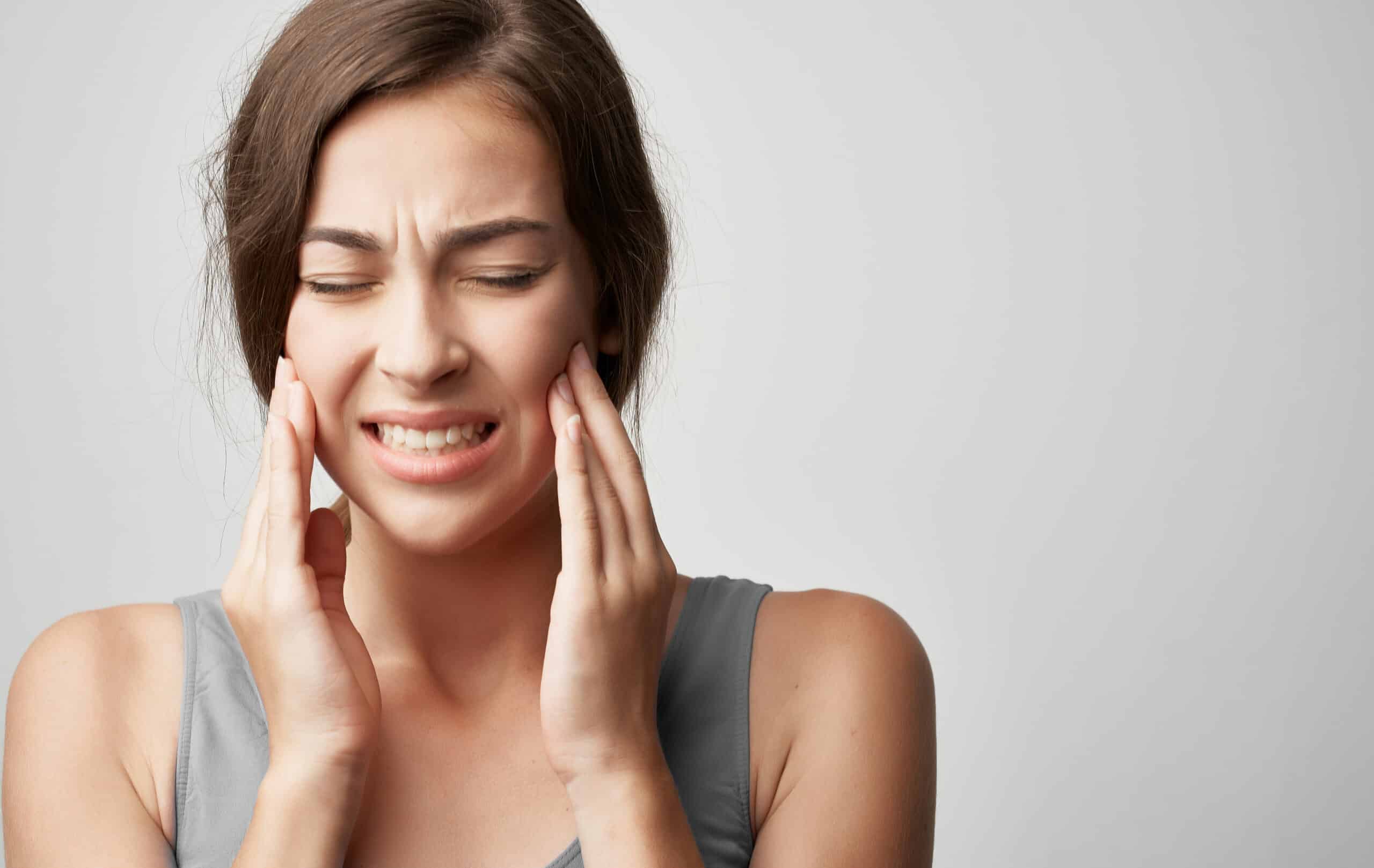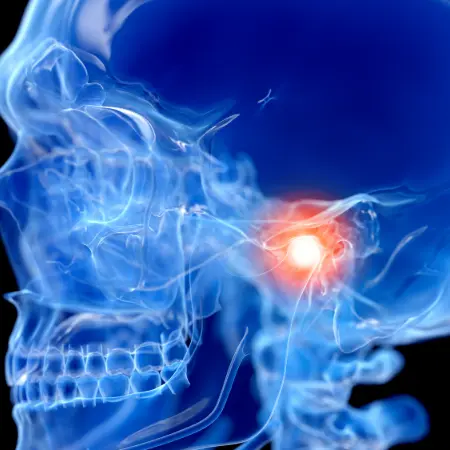TMJ Treatment

What Is TMJ Therapy?
TMJ therapy, also known as temporomandibular joint treatment, is focused on correcting a misaligned jaw. TMJ is the acronym for the temporomandibular joint. TMJ pain can be caused by many underlying factors.
TMD stands for temporomandibular disorders, which is a group of conditions that cause jaw pain and other jaw issues. Usually, TMJ pain happens when the joint that connects to the lower jaw becomes injured or shifts out of place, causing discomfort and misalignment. This most often happens due to teeth grinding (bruxism), arthritis, and head, neck, or jaw injury.
Common symptoms of TMJ are:
- Headaches
- Discomfort in the neck, shoulders, and ears
- Trouble chewing and talking
- Locked jaw
- Difficulty opening the mouth wide
- Popping or clicking sounds in the jaw
Our dentist may suggest different treatment options, depending on the severity of your TMJ disorder. These options can include muscle exercises, dietary changes, a mouth or night guard, and, in more intensive cases, jaw surgery.
After determining the extent of the treatment needed, our dentist will create a treatment plan with you to help you find the relief you need.
Causes of TMJ Disorder
TMJ issues are often the result of multiple overlapping factors. Some of the most common causes include:
- Teeth Grinding and Clenching (Bruxism): Constant clenching or grinding puts strain on the jaw muscles and joints. Many people grind their teeth at night without realizing it.
- Bite Misalignment: When the upper and lower teeth do not fit together properly, the jaw must work harder to function, which can create strain.
- Stress and Anxiety: Stress often leads to habits such as clenching the jaw or grinding the teeth, which worsen TMJ symptoms.
- Arthritis: Both osteoarthritis and rheumatoid arthritis can affect the jaw joint and reduce smooth movement.
- Trauma or Injury: A blow to the face, whiplash, or other head and neck injuries may damage the joint.
- Poor Posture: Forward head posture, common for people who spend long hours on computers or phones, places additional stress on the jaw and neck muscles.
- Genetics and Hormonal Factors: Some people may have a genetic predisposition to joint problems, and research suggests that hormones could influence TMH risk, especially in women.


The Risks of Ignoring TMJ Pain
Many patients hope their TMJ discomfort will go away on its own, but ignoring persistent symptoms can have long-term consequences.
- Chronic Pain: Discomfort can worsen over time and spread to other parts of the body.
- Tooth Damage: Clenching and grinding wear down enamel, leading to fractures or sensitivity.
- Sleep Disturbances: TMJ pain may disrupt quality and contribute to fatigue.
- Worsening Bite Problems: Misalignment can become more pronounced without intervention.
- Joint Damage: Severe cases may lead to arthritis or permanent damage to the jaw joint.
Why Choose Physiological Dentistry for TMJ Treatment?
Unlike conventional approaches that only address surface-level symptoms, physiological dentistry focuses on the connection between the teeth, jaw, muscles, and overall body function.
Dr. DeStefano uses advanced diagnostic tools to analyze your bite and jaw movement. By determining the root cause of your discomfort, he can design a treatment plan that not only reduces pain but also promotes long-term stability.
Benefits of physiological dentistry for TMJ treatment include:
- Comprehensive Evaluation: Your bite, jaw alignment, and muscle activity are carefully measured.
- Long-Term Relief: By correcting imbalances, treatment addresses the cause instead of just the symptoms.
- Improved Function: Restoring balance improves chewing efficiency, speech, and discomfort.
- Whole-Body Benefits: Correcting jaw position can reduce neck and back tension and improve posture.

Treatment Options for TMJ Pain
At DeStefano Dentistry, we offer several treatments for TMJ pain and TMJ disorders. Every patient is different, and the causes of TMJ issues vary. So, Dr. DeStefano will work with you to figure out the root causes and find treatments that address them.
If you have recently had severe trauma to the head, neck, or shoulders, we recommend also seeing your family physician or checking in to the emergency room before seeking treatment from our dentist. For other types of TMJ pain, we are here to assist you with dental interventions.
Learn more about our TMJ services or call our office to set up a consultation.

Benefits of Seeking TMJ Treatment
Patients who pursue TMJ care often notice improvements in many aspects of their health and daily life.
- Improved Sleep: Pain relief allows for deeper, uninterrupted rest.
- Reduced Headaches: Many patients experience fewer or less severe headaches.
- Better Chewing Function: Eating becomes easier and more comfortable.
- Protection of Teeth: Oral appliances prevent damage caused by grinding.
- Increased Comfort and Confidence: Relief from jaw pain allows you to focus on work, relationships, and daily activities without constant discomfort.
Why Choose DeStefano Dentistry for TMJ Treatment?
When you are living with jaw pain, you want a dental team that combines experience, compassion, and advanced technology. At DeStefano Dentistry, we take pride in offering more than just treatment; we provide a supportive environment where your comfort and long-term health come first.
Here’s what sets us apart:
Is TMJ Pain Treated with Surgery?
Surgical interventions for TMJ pain do exist. For many patients, non-surgical interventions are adequate to treat the symptoms. However, some patients may need surgery if other treatment options aren’t working.
Dr. DeStefano will make a customized treatment plan for you and adjust the process until he finds what works best for you. If surgery is necessary, he will discuss this with you and help you find an experienced oral surgeon.

Frequently Asked Questions About TMJ Disorders and Treatment
Call for TMJ Relief!
TMJ pain can be difficult to ignore and make it hard to sleep and enjoy daily activities. The friendly staff at DeStefano Dentistry wants you to have a positive experience with our office, and Dr. DeStefano will provide compassionate treatment to address your TMJ pain.
For more information about our treatments for TMJ disorder, contact our dental office and schedule an appointment with our knowledgeable dentist today.

